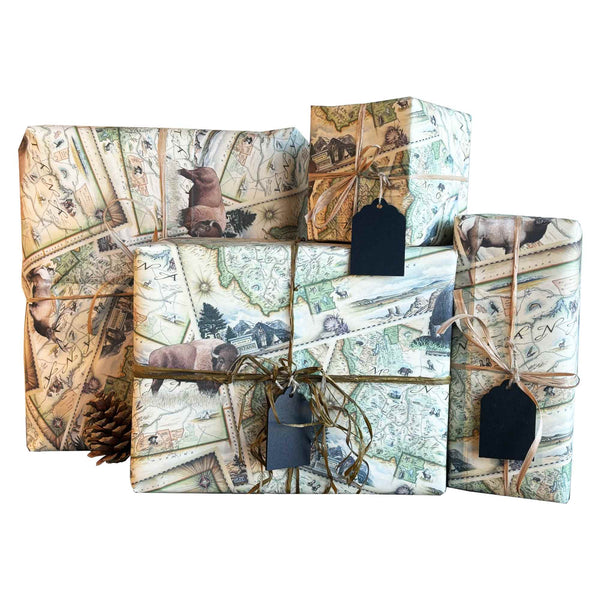Mapping the Frontlines of Conservation
Believe it or not, after working as a professional international adventure guide and media personality for twenty years… this is my very first attempt at writing a travel blog. Moving forward, you can expect to read more but for now I am going to take you back to the beginning of my partnership with Xplorer Maps.

Mandela looks over various maps of Zambia at Xplorer Maps world headquarters before flying into Lusaka, the capital of Zambia.
My journey as the Director of Content and Community AKA “Lead-Storyteller” began in the late summer of 2023 when I first met with the Xplorer Maps team, namely their CEO, Greg Robitallie. I pulled up to their brick and mortar store located on the corner of 3rd and Inez, parked my old Land Rover and met Greg in the middle of the street whilst carrying a pile of maps for my upcoming project in Zambia (it’s not uncommon to see me walking around town with a world atlas and scroll of maps). During our initial meeting, we discovered all the similarities between my work and the ongoing work of their small family owned business, a hand drawn art map company who shared my exact same mission statement: “Connecting People and Place”. We also discovered our shared roots on the African continent as well as our love of conservation, art, history, culture, and most of all community.
Up until this partnership, I had to work hard as a river guide and full time employee of the National Wildlife Federation in order to save up and fund my international conservation and outreach projects. In October and November of 2023, I was planning to go to Zambia in order to document stories from the frontlines of the poaching epidemic. After I explained my approach to working with communities in order to preserve wildlife and wildlife habitat, Xplorer Maps expressed interest in sponsoring the Zambia project.
In September of 2023, I stepped away from my fulltime work at the National Wildlife Federation in order to join the team at Xplorer Maps with the intention of truly giving back to global communities, wildlife and ecosystems. As part of my role with Xplorer Maps, I provide free adventure presentations for the community and travel the world using our hand drawn story maps in order to educate and inspire future generations of conservationists and cartographers.
 Christina Malake is an Education Ranger whose role is to educate, empower and engage Zambia’s children to protect their natural heritage.
Christina Malake is an Education Ranger whose role is to educate, empower and engage Zambia’s children to protect their natural heritage.
It truly makes sense that this story begins in Africa. According to current scientific understanding, the earliest Homo sapiens fossils have been found in Africa. Furthermore, Chris Robitaille, the artist behind Xplorer Maps began drawing from a young age and established his first contract to draw maps with an advertising agency while living in Kenya in the 1990s. The map of Zambia was the third map Chris drew for the agency and it quickly became one of my favorites as it accompanied me during my time driving around Zambia in a Toyota Land Cruiser.
One of the most prominent features of our Zambia map is the dark green outline of Kafue National Park, the largest national park in Zambia, (similar in size to Massachusetts) and second largest national park in Africa. Kafue National Park is home to 152 different species of mammals, 515 species of birds, 70 species of reptiles, 58 species of fish and 36 species of amphibians. I will always remember my time living on the edge of the park with Zambia’s Special Antipoaching Unit (SAPU) and many amazing mornings as I walked with subadult elephants in the elephant release facility – two of the three pillars of holistic conservation according to our park partner in Zambia, Game Rangers International (GRI).

Game Rangers International is a non-profit organisation working in Zambia alongside the Department of National Parks and Wildlife (DNPW) and the local communities to protect Zambia's wildlife and wild spaces. The organisation has been active in Zambia since 2008, and embraces a holistic approach to conservation, empowering frontline rangers and support rangers across three core thematic areas: Resource Protection, Wildlife Rescue and Community Outreach.
Resource Protection
Wildlife and protected areas across Africa suffer increasing threats from poaching and encroachment whilst underfunded and under-resourced law enforcement struggles to combat these threats. GRI’s Resource Protection Programme focuses on empowering the frontline rangers who protect wildlife against threats such as poaching as well as protecting the communities and promoting human-wildlife coexistence.
To date, the SAPU have arrested 710 poachers & traffickers, seized 361 illegal firearms, recovered 15 live pangolins and seized 820lbs of ivory.

Mandela joins one of GRI’s Community Outreach Rangers at a school in a remote village near Kafue National Park.
Wildlife Rescue
In the 1930s, surveys suggested we had around 10 million elephants on the African continent. As of 2024, we have less than 400,000. At least 20,000 elephants are killed each year for their tusks and that number doesn’t include the amount of elephants killed due to human wildlife conflict such as farmers protecting their crop from hungry elephant herds. Needless to say, of the thousands of elephants killed each year – many are mothers.
GRI’s Wildlife Rescue Programme works with the Department of National Parks and Wildlife Veterinary Unit to support welfare provisions for Zambia’s wildlife. These efforts began in 2007 with the establishment of GRI’s Elephant Orphanage Project and has grown to support a number of additional wildlife species over the years. Their nursery in Lusaka rescues, rehabilitates and releases elephants who have been separated from their herd and mother through human intervention. The Elephant Orphanage Project remains GRI’s primary project with their nursery and a release facility in Kafue National Park, where the orphans are gradually reintegrated back into the wild. To date, GRI has reintroduced over 60 orphaned elephants back into the wild and recently an orphaned female mated with a wild male resulting in the birth of a calf.
Community Outreach
Long-term conservation can only be achieved if communities living around protected areas are educated, engaged, and able to experience the benefits of healthy and viable ecosystems. GRI’s Community Outreach Programme focusses on educating, empowering and engaging the communities living contiguous to protected areas, ensuring that this generation and next appreciate the importance of a viable eco-system.
During my time in Zambia, I spent much of my time interviewing women’s empowerment groups about climate change and human wildlife conflict whilst dancing, singing and learning about each other's cultures. I will forever cherish my time with these incredible women.
 To date, over 180 women have been empowered with sustainable livelihood training through GRI.
To date, over 180 women have been empowered with sustainable livelihood training through GRI.
Eventually, I would like to write an entire chapter in a book about my time in Zambia representing Xplorer Maps. For now, I would like to answer the question I am sure many readers have on their mind: How can I help?
Through my 40-day project with Game Rangers International, I had the opportunity to connect with some of the most inspiring and resilient people I’ve ever met. Even though they live in a landlocked African country, they have much in common with those of us living in the West: They struggle to grow crops and raise livestock because of wildfires, deforestation, flash floods, carnivores and intense heat waves. They want their children to have access to a good education whilst having the opportunity to to enjoy Zambia’s native plants and wildlife. One of the key messages I was asked to share when I returned home was, “Please come to Zambia. Please come enjoy our incredible country. Please help our communities by volunteering or supporting your nonprofit of choice.”
With that being said, I want to close my first (ever) travel blog by encouraging you to look into GRI’s three week volunteer program. You will assist GRI at each of their locations, where you will encounter the three pillars of conservation we discussed in this blog: Resource Protection, Wildlife Rescue and Community Outreach.
During your three week placement in Zambia, you will be living in bush camps, observing elephant behaviour, delivering conservation education, and cooking by the campfire, all while surrounded by wildlife – a remarkable experience, for conservation enthusiasts of all ages.
If you are interested in learning more about my time in Africa or would like to hear more adventures from the frontlines of conservation, please plan on attending my next live storytelling event at Xplorer Maps. It’s CARTOGRAPHY COMES ALIVE on Wednesday, February 12th from 6:30-8pm.

